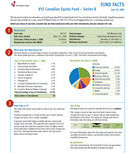Mutual Funds
Mutual funds pool money received from investors. A manager invests this money in various types of investments in line with the fund’s investment objectives. These objectives could be, for example, to:
- Preserve the amounts invested (capital);
- Generate a steady income;
- Maximize capital growth.
When you invest in a mutual fund, you receive a security that entitles you to a portion of the value of the fund. Generally, you may decide when you want to sell (redeem) your mutual fund securities (units). The value of a mutual fund security is usually calculated once each day.
Mutual Fund Features
| EXPECTED RETURN | LIQUIDITY | RISK |
|---|---|---|
In the form of:
| You can generally redeem your securities from the fund at all times. | Low to high The risk depends on the fund's investments (e.g., bonds, stocks, etc.). Mutual fund securities are not guaranteed. |
Mutual Fund Categories
| CATEGORIES | EXAMPLES OF FUND INVESTMENTS | RISK AND RETURN |
|---|---|---|
| Money market | Short-term debt securitiesA debt security is a security representing a loan or debt. Bonds and debentures, which are loans granted by investors to a company, are examples of debt securities. , such as Treasury billsA treasury bill is a short-term investment guaranteed by a government. It reaches maturity within a year at most. At maturity, the government pays out a greater amount than the amount invested. and short-term bonds issued by governments and corporations. | These funds are usually very low-risk and offer modest but stable returns. |
| Fixed income | Debt securities such as bonds and debenturesA debenture is a fixed-income investment, similar to bonds, except that debentures are generally not backed by specific assets. Also called unsecured bond. that pay regular interest, or preferred sharesA preferred share is a share that normally gives holders the right to receive a dividend before the dividends for holders of common shares are calculated. Dividends can either be fixed or calculated according to a specific formula. For example, the dividend will be $0.3125 per quarter for the first five years, then adjusted every five years according to the rate for five-year Government of Canada bonds plus four per cent. It is possible that holders of preferred shares will receive a dividend, but that holders of common shares will not. of companies that pay regular dividends. | Low to moderate risk: These funds generally provide regular income. The value will fluctuate based on changes in interest rates. |
| Balanced | Combination of equities, debt securities and money market instruments. | Moderate risk: These funds provide some level of investment diversification, which may to a certain extent limit fluctuations in investment return. |
| Equity | Common shares of Canadian and foreign companies. Some funds focus on the securities of large companies with an investment-grade rating from credit rating agencies. Others, on the contrary, focus on securities of smaller but often riskier companies. | High risk: The return depends on the securities selected by the portfolio manager and the portfolio itself. |
| International | Securities of foreign companies or governments. These funds offer investors international diversification. | These funds involve risks associated with investing in foreign markets. The return depends on the type of fund (fixed income, balanced, equity). |
| Specialized | Investments in a specific geographic area, such as Asia, or in a specific industry, such as high tech. | These funds carry a certain level of market-related risk, such as currency riskCurrency risk is the risk that the currency used to purchase your investment will fluctuate to your disadvantage. For example, if you hold bonds in U.S. dollars and the value of the Canadian dollar increases against the U.S. dollar, then the value of your bonds, once converted into Canadian dollars, will decrease. and political risk, or risk related to a lack of geographic or industry diversification. The return depends on the type of fund (fixed income, balanced, equity). |
| Index | Investments designed to match a reference index, such as a stock market index. | The risk is related to that of the reference index. The return will reflect that of the selected index, less the fees paid by the fund. |
| Ethical (socially conscious) | Investments that take into consideration environmental or ethical criteria. These criteria may vary depending on the fund’s objectives. | The risk and return will depend on the choice of securities and market conditions. |
Mutual Fund Facts

Here is an example of a Funds Facts that will be given to you or will be available on the institution's website.
For more detailed information on the different sections, view the Mutual Fund Facts sample.
